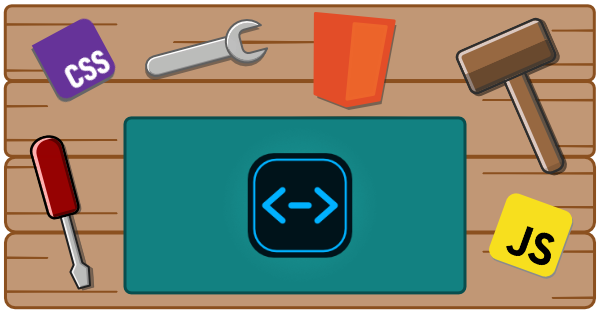
WCTools

The Web Component Tools project is a suite of tools designed to make the integration and validation of web components/custom elements easier for teams using them in their projects.
The project currently consists of the CLI tool, but more are on their way.
Web Component Linter (validate)
wctools validate CLI command statically analyzes your code to quickly find problems using information from the Custom Elements Manifest (CEM). Editor support can be found using the Web Component Language Server and you can run wctools as part of your continuous integration pipeline.
Features
- 🔍 Web Components Validation - Validates custom elements, attributes, and their values against Custom Elements Manifest
- 🎯 Unknown Element Detection - Identifies unregistered custom elements
- ⚠️ Unknown Attribute Detection - Finds attributes not defined in the manifest
- 📊 Multiple Output Formats - Text, JSON, JUnit XML, Checkstyle XML, SARIF, HTML
- 🎨 Colored Output - Terminal-friendly formatting with colors and icons
- ⚙️ Configurable - Flexible configuration via JSON or JavaScript files
- 🔧 CLI Integration - Perfect for CI/CD pipelines and build processes
Installation
# Install globallynpm install -g @wc-toolkit/wctools
# Or install locally in your projectnpm install --save-dev @wc-toolkit/wctoolsQuick Start
-
Validate your files - use the default configuration:
Terminal window wctools validate -
Initialize a configuration (optional) - create custom behavior for the toolkit:
Terminal window wctools init
Usage
Commands
The commands follow a similar pattern to ESLint.
wctools [command] [options] [file|dir|glob]*Validate Web Component files against Custom Elements Manifest.
# Validate using a custom or default configwctools validate
# Validate specific fileswctools validate src/components/*.html
# Validate with glob patternswctools validate "src/**/*.{html,js,ts}"
# Different output formats - default is `text`wctools validate --format json src/*.htmlwctools validate --format junit src/*.html > results.xmlwctools validate --format checkstyle src/*.htmlOptions:
-f, --format <format>- Output format:text | json | junit | checkstyle | sarif | html(default:text)-c, --config <path>- Explicit path to config file (overrides auto-discovery)--no-color- Disable colored output-v, --verbose- Show files with no issues
Additional Options:
-o, --output <file>- Write results to a file. When--formatis omitted, the CLI attempts to infer from extension (.json,.xml,.sarif,.html).
Custom Configuration
Create a sample configuration file. This file uses the same format as the Language Server and will be shared by both.
The configuration will give you default values, but all of the settings are required, so feel free to remove those that you don’t need.
# Create default configwctools initNOTE: Place
wc.config.js(or another supported name) at the project root for auto-detection.
The generated configuration shows all available options for clarity; every field is optional. Remove entries you do not need.
Supported config filenames (auto-discovered in project root):
wc.config.js / .cjs / .mjs / .ts
Disabling diagnostics in source
wctools supports in-source comments to suppress diagnostics similar to ESLint. Use HTML comments to disable rules globally or for the next line. Multiple rules may be listed and will stack. Rules can be separated by spaces or commas.
Examples:
- Disable all diagnostics for the file:
<!-- wctools-ignore -->- Disable specific rules for the file (stacked, comma or space separated):
<!-- wctools-ignore unknownAttribute deprecatedAttribute -->- Disable a rule for the next line:
<!-- wctools-ignore-next-line deprecatedAttribute --><my-element deprecated-attr></my-element>These directives are useful to locally silence known, acceptable deviations without changing global configuration.
Programmatic API
You can also import types and the programmatic adapter directly from @wc-toolkit/wctools when using this package as a dependency:
import { lintWebComponents, type LintWebComponentsOptions,} from "@wc-toolkit/wctools";
const options: LintWebComponentsOptions = { format: "html", // any: text|json|junit|checkstyle|sarif|html output: "lint-result.html",};await lintWebComponents(["src/**/*.html"], options);This is useful for embedding the validator in build scripts or custom tooling without spawning child processes.
Output Formats
Choose an output format based on who (or what) will consume the results:
- Use the default Text format for quick, human-readable checks in a terminal.
- Use JSON when you need a machine-readable export for dashboards, scripts, or editor integrations.
- Use JUnit XML to integrate with CI systems that display test reports (GitHub Actions, GitLab, Jenkins).
- Use Checkstyle XML when you want to feed results into code-quality tools or PR annotation bots that understand the Checkstyle schema.
- SARIF is useful for CI code-scanning integrations and security tools.
Below are short notes on common consumers and why a format might be preferred.
Which to Pick
- Local developer runs:
text(fast, readable). - Automation / integrations:
json,junit, orcheckstyledepending on the consuming tool. - CI reporting & historical metrics: prefer structured formats (
junit,json, orsarif) so results can be stored and trended.
Text Format (Default)
# default lint command uses text outputwctools validate
# manual file outputwctools validate --format text --output report.txtsrc/components/my-element.html: 💡 Hint 1:15 Unknown element: my-custom-element 💡 Hint 1:30 Unknown attribute: unknown-attr
Found 2 hints in 1 file.JSON Format
wctools validate --format json --output report.json[ { "file": "src/components/my-element.html", "diagnostics": [ { "range": { "start": { "line": 0, "character": 14 }, "end": { "line": 0, "character": 31 } }, "severity": 4, "message": "Unknown element: my-custom-element" } ] }]JUnit XML Format
wctools validate --format junit --output report.xml<?xml version="1.0" encoding="UTF-8"?><testsuite name="wctools" tests="1" failures="0"> <testcase name="src/components/my-element.html" classname="WebComponentValidation"/></testsuite>Checkstyle XML Format
wctools validate --format checkstyle --output report.xml<?xml version="1.0" encoding="UTF-8"?><checkstyle version="1.0"> <file name="src/components/my-element.html"> <error line="1" column="15" severity="hint" message="Unknown element: my-custom-element" source="wctools"/> </file></checkstyle>SARIF Format
wctools validate --format sarif --output report.json{ "$schema": "https://schemastore.azurewebsites.net/schemas/json/sarif-2.1.0-rtm.5.json", "version": "2.1.0", "runs": [ { "tool": { "driver": { "name": "wctools", "informationUri": "https://wc-toolkit.com" } }, "results": [ { "ruleId": "WC001", "level": "note", "message": { "text": "Unknown element: my-custom-element" }, "locations": [ { "physicalLocation": { "artifactLocation": { "uri": "src/components/my-element.html" }, "region": { "startLine": 1, "startColumn": 15 } } } ] } ] } ]}The CLI emits SARIF 2.1.0 with basic tool/driver metadata and rules mapped to diagnostics so code scanning and SARIF viewers can display issues correctly.
HTML Report
Generate a single-file HTML report suitable for attaching as CI artifacts or sharing with teammates. The HTML is styled and responsive for quick inspection in a browser.
wctools validate --format html --output report.htmlWhen saving HTML as a CI artifact you can open it in the browser or attach it to pull requests for easy review.
CI/CD Integration
GitHub Actions
name: Validate Web Componentson: [push, pull_request]
jobs: validate: runs-on: ubuntu-latest steps: - uses: actions/checkout@v3 - uses: actions/setup-node@v3 with: node-version: "18" - run: npm ci - run: npx wctoolsGitLab CI
validate-web-components: stage: test script: - npm ci - npx wctools validate --format junit "src/**/*.html" > validation-results.xml artifacts: reports: junit: validation-results.xmlnpm Scripts
{ "scripts": { "validate:wc": "wctools validate \"src/**/*.{html,js,ts}\"", "validate:wc:ci": "wctools validate --format junit \"src/**/*.html\" > validation-results.xml" }}Examples
Basic Validation
# Validate all HTML files in src directorywctools validate "src/**/*.html"
# Validate specific fileswctools validate src/button.html src/card.html
# Validate with verbose output to see all files processedwctools validate --verbose "**/*.html"Custom Configuration
# Different output formats for CIwctools validate --format junit "src/**/*.html" > results.xmlwctools validate --format checkstyle "src/**/*.html" > checkstyle.xmlwctools validate --format json "src/**/*.html" > results.jsonIntegration with Build Tools
# Validate with buildnpm run build && npm run validate:wc
# Validate in watch mode (using nodemon or similar)nodemon --watch src --ext html,js,ts --exec "wctools validate 'src/**/*.html'"Validate only changed files
You can run wctools only on files that have changed by using git to list changed filenames and passing them to the CLI. Below are a few common patterns.
- Changed in working tree (including unstaged/staged):
# find changed files and validate themgit ls-files --modified --others --exclude-standard -- 'src/**/*.{html,js,ts}' | \ xargs -r npx wctools validate- Staged files only:
git diff --name-only --cached -- 'src/**/*.{html,js,ts}' | \ xargs -r npx wctools validate- Files changed in the last commit:
git diff --name-only HEAD~1..HEAD -- 'src/**/*.{html,js,ts}' | \ xargs -r npx wctools validate- Files changed between branches or PR ranges (useful in CI):
git fetch origin maingit diff --name-only origin/main...HEAD -- 'src/**/*.{html,js,ts}' | \ xargs -r npx wctools validateNotes:
xargs -r(GNU) orxargs --no-run-if-emptyavoids running the command when there are no files.- Adjust the glob to match the files you want to validate.
- If you prefer JSON/JUnit output for CI, add
--format json|junitand redirect output.
Example npm scripts:
{ "scripts": { "validate:changed": "git diff --name-only origin/main...HEAD -- 'src/**/*.{html,js,ts}' | xargs -r npx wctools validate", "validate:staged": "git diff --name-only --cached -- 'src/**/*.{html,js,ts}' | xargs -r npx wctools validate" }}Example GitHub Actions step (validate changed files in a PR):
- name: Validate changed files with wctools run: | git fetch origin ${{ github.base_ref }} --depth=1 git diff --name-only origin/${{ github.base_ref }}...HEAD -- 'src/**/*.{html,js,ts}' | \ xargs -r npx wctools validate --format junit > validation-results.xml || true # upload validation-results.xml as an artifact or use it as a report